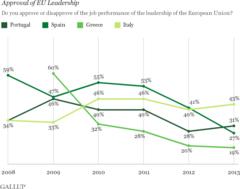 No surprises here: hours after we reported that youth unemployment in Spain soared to fresh record highs (surpassing the already nosebleeding number of jobless people under 25 in Greece), here comes Gallup with a poll showing the approval rating of the (unelected) EU Leadership across the peripheral countries. And while there was a slight uptick in approval among respondents in Italy - the country that has so far benefited the most from the Italian central banker at the helm of the ECB - *the EU's lack of approval just rose to all time highs in the two countries that continue to see their youth employment hopes crushed by the European experiment, with approval in Spain sliding to 27% (from 55% in 2010), while Greece, plunged to only 19%, *which makes one wonder: just who has an interest in keeping Greece in Europe?
No surprises here: hours after we reported that youth unemployment in Spain soared to fresh record highs (surpassing the already nosebleeding number of jobless people under 25 in Greece), here comes Gallup with a poll showing the approval rating of the (unelected) EU Leadership across the peripheral countries. And while there was a slight uptick in approval among respondents in Italy - the country that has so far benefited the most from the Italian central banker at the helm of the ECB - *the EU's lack of approval just rose to all time highs in the two countries that continue to see their youth employment hopes crushed by the European experiment, with approval in Spain sliding to 27% (from 55% in 2010), while Greece, plunged to only 19%, *which makes one wonder: just who has an interest in keeping Greece in Europe?Gallup also finds that one doesn't need an army of unemployed youths for displeasure toward the EU to be at all time highs: "Although it suffered double-digit losses in support in countries such as Cyprus and Spain (the latter of which exited the bailout program at the end of 2013), low approval of the EU's leadership was not limited to bailout countries. *Fewer than one in three approved of the EU's leadership in the United Kingdom, the Czech Republic, and Sweden.*"
And, just as unsurprisingly, the countries who have benefited the most from the EU, Germany, Luxembourg and Belgium, are those where EU leadership can count on a majority approval. Approval has remained relatively high in Germany, which many observers see as one of the economic and political leaders of the EU, and in Belgium and Luxembourg, where many of the EU institutions are located. Even in these countries, however, at least one in five disapprove.
The final non-surprise comes from Gallup's focus on young poll respondents, those aged 15 to 30. "Europeans between the ages of 15 and 30 are and have been, on average, the most likely to support the EU's leadership. In 2011, a majority of young people in only a handful of countries disapproved of the EU's leadership. In 2013, the youngest generation continued to be the most likely to approve of EU leadership compared with the older age groups. In 14 EU countries, a majority of this youngest group approved of EU leadership. *Despite continued approval of EU leadership among the younger generation, recent developments appear to have negatively affected young peoples' perceptions of the EU. *In 2013, approval of EU leadership declined among the youngest group in several countries, including some of the bailout countries where the EU-imposed austerity measures have disproportionately affected the younger generation's job prospects and economic well-being."
Of not: the epic collapse in EU approval among Spain's youth, which has crumbled from 73% in 2008 to only 39% in 2013, a -34% change, followed by Ireland at -18% and pre-triple dip recession France at -17% where only 47% now approve of the EU.
Gallup's conclusion:
Economic insecurity has weakened support for EU leadership among residents in many European countries since 2008. Disapproval is clearest in the bailout countries where the EU has imposed austerity policies, compounding the economic hardships individuals were already experiencing from the financial and economic crisis.
But the problem is not merely economic. Individuals' sense of disconnect from EU power is clear from the dwindling turnouts in EU elections, an ongoing trend since the first popular vote to elect EU officials in 1979.
Concerns about immigration voiced in the media and the rise in popularity of radical right-wing parties and movements in Austria, France, Greece, Hungary, Italy, and the Netherlands indicate that a sizable segment of the public sees the EU as unable to provide satisfactory responses to their concerns.
Perhaps the only surprise in the study above is that the EU leadership still finds some approval among the peripheral European nations. Reported by Zero Hedge 10 hours ago.